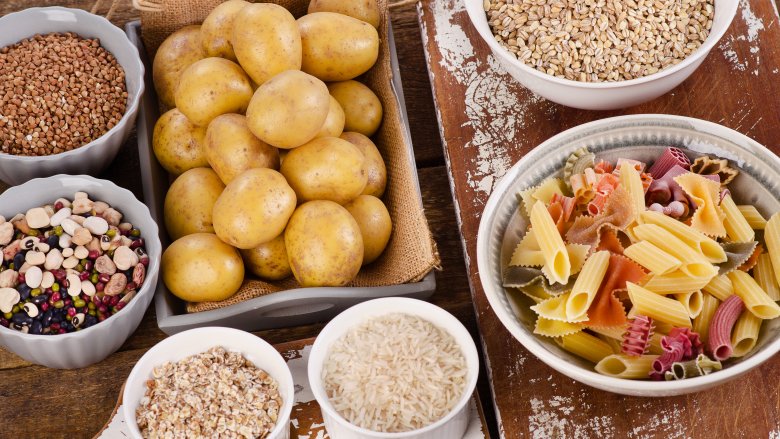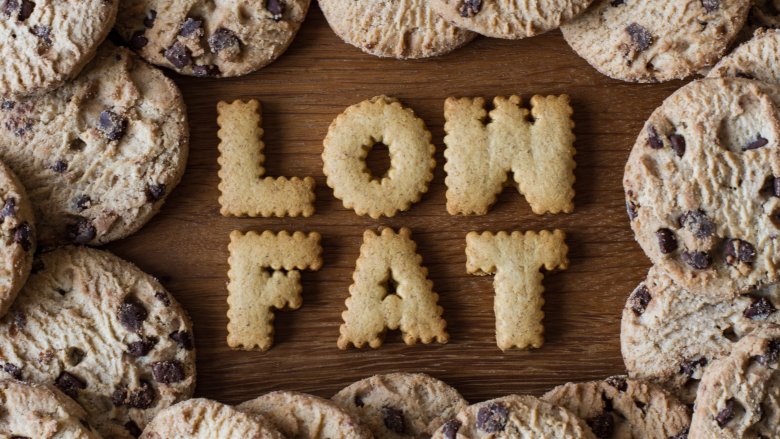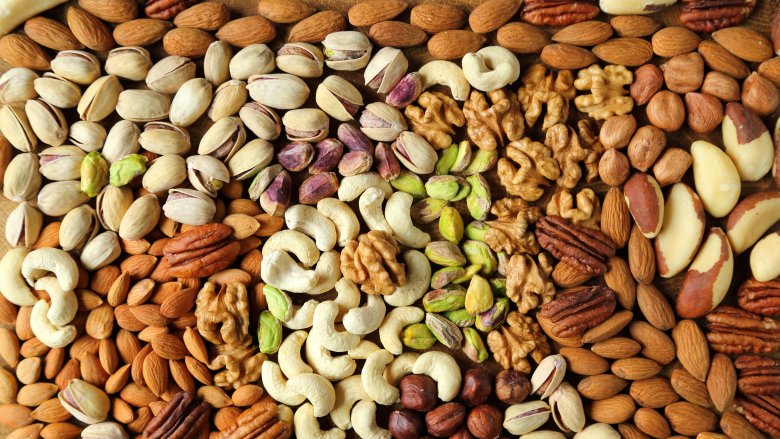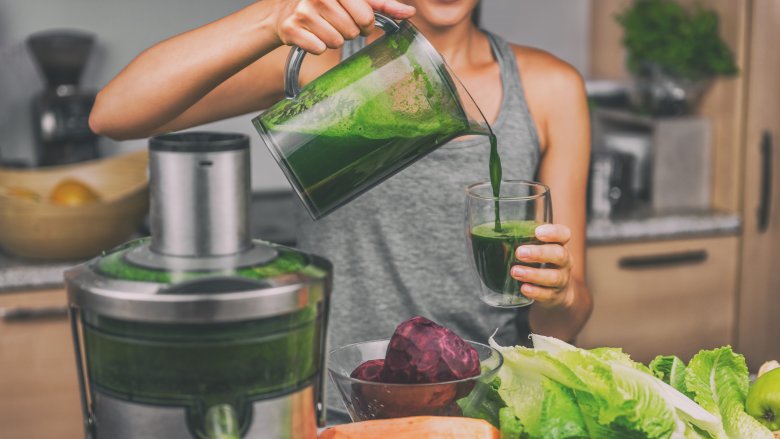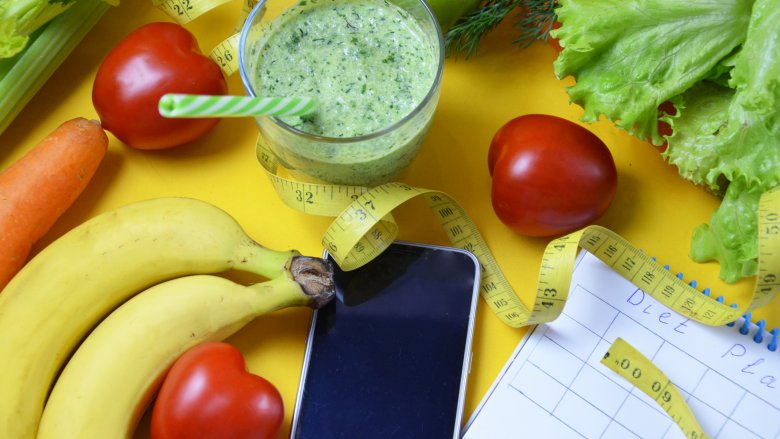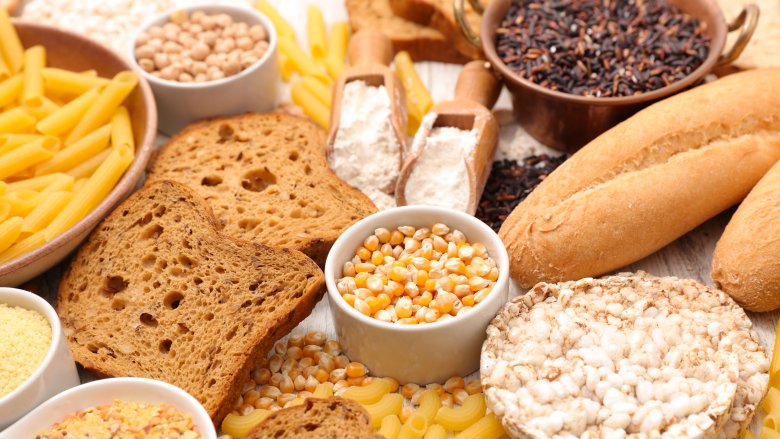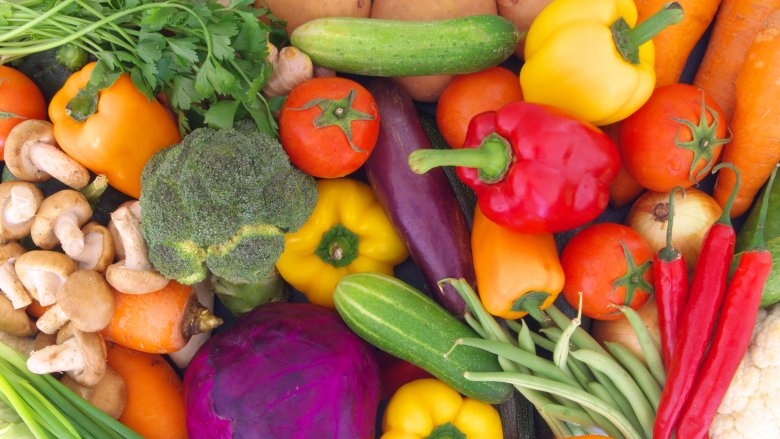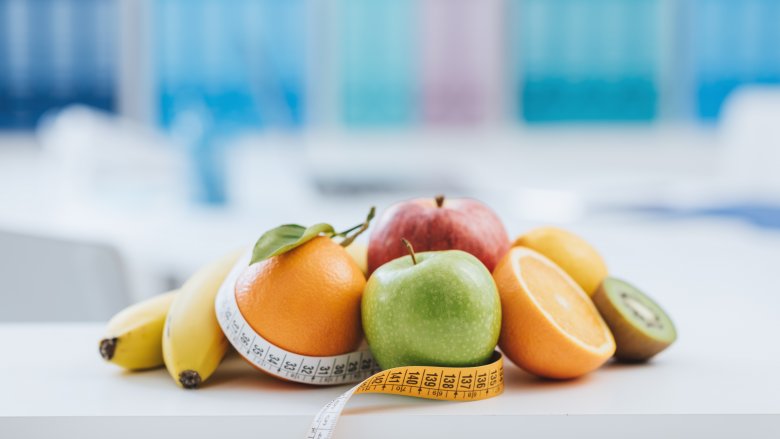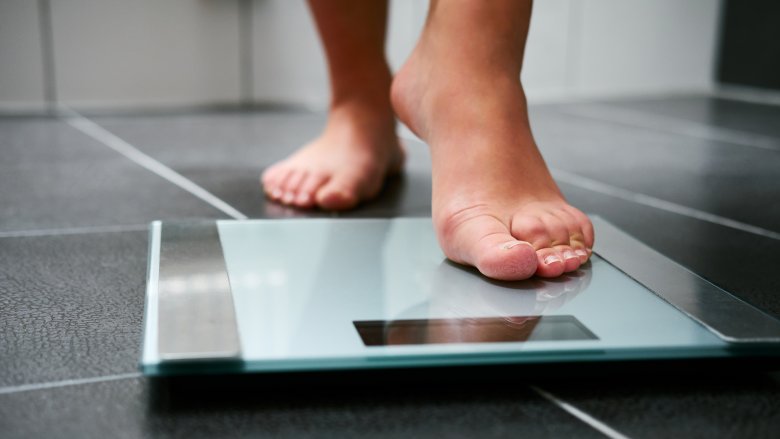New Year's Food Resolutions That Are Actually Terrible For Your Health
New Year, new you. That's the idea, right? As we all usher in another 365 days on Earth, we each take restrictive measures and set personal goals with the hope of improving ourselves over the course of the year. Some of us aim low (remember to feed the fish more often; spend less time on your phone), while others tend to aim higher (purchase a hot air balloon; attempt to traverse the Bermuda Triangle unharmed). A few of us even try to improve our eating habits — and there are any number of ways you can do this. Unfortunately, most of them will mess you up pretty badly.
Sure, the idea of cutting out carbs, or drinking more juice, or burning calories at a crazy rate might seem like an ideal way to start the new year, but go about these resolutions in the wrong way and you'll end up a miserable, unhealthy wreck before February. And that's no fun for anyone, is it?
Cutting out carbs
In theory, this seems like a great idea. We've all heard about those nasty carbohydrates, haven't we? Ask basically anyone how best to lose weight and a fair few of them are going to suggest getting rid of all that pasta, bread and rice. To an extent, of course, this is true: cutting out carbs will cause you to lose weight.
But there are many pitfalls to a low-carb diet. For one, many people replace the carbs in their diet with high-fat foods such as coconut oil, nuts, seeds, avocados and full-fat cheese, which are far easier to over-eat — likely causing you to gain weight in the long run. Not only that, but removing carbs from your diet altogether will cause you further health problems. Yes, you'll lose weight at first, but this is mostly because your body is using up the stored glycogen in your muscles and liver to replace the carbs you're not giving it — not because you're losing fat.
Carbs are a vital part of your diet and contribute to your state of mind and energy levels. Lose them altogether and you'll suffer. Keep a regular, moderate intake, however, while cutting out some of the worst offenders, and you'll start to see actual, positive results in no time.
Eating "diet" foods
Here's a good rule of thumb for when you're thinking of changing up what foods you buy: always assume you're being hustled, and if it seems too good to be true then it almost certainly is. Yes, you can walk into a supermarket and, spurred on by that dynamite new resolution of yours, resolve to only buy products marked "low fat" or "diet." But try to remember what you're probably getting instead: sugar.
In response to media attention and public awareness of the dangers of fatty foods, manufacturers have jumped at the chance to lower the saturated fat levels in their products — but they increase the amount of sugar in those products to keep them tasting good. Foods can all be spun to seem like they're giving you a health kick with the addition of a "low-fat" label, when really you're just swapping one vice for another. Be wary, and always read the whole label.
Getting rid of fatty foods
If you're trying to cut fat from your body, it makes sense to cut fat from your diet. And you should, in moderation — we can always do with consuming less saturated fat and trans fat. But that doesn't mean it's a good idea to start eating entirely fat-free — that can be detrimental to your health in ways you probably haven't considered.
Good fats, which are monounsaturated fats and polyunsaturated fats, help your body to absorb vitamins, build cell membranes, and facilitate your ability to heal and repair yourself. They protect your organs, and they help keep your body temperature from dipping too low. They also fill you up, help lower your bad cholesterol, and may improve your blood sugar levels. Get rid of fatty foods and you lose all that. As we ring in the New Year, forget cutting out fats altogether and focus on eating the right kind of fats. To get more good fats, reach for foods like avocados, nuts, oily fish, dark chocolate, and eggs.
Juicing
Juicing is another trend that tends to do more harm than good. It might seem like a good way to get more fruit and veggies into your diet, but this could well be one of the worst ways to go about doing that. Juicing fruits removes the fibers, but leaves all the sugars. Those fibers slow down the digestion of the sugars in the fruits (spoiler alert: there's a lot) — and losing them can lead to spikes in your blood sugar levels.
In fact, juicing to lose weight tends to backfire, as all those fruits and veggies crammed into one drink usually ends up being a calorie bomb. That's not going to help with your waistline at all.
Making your own juice is also a lot more dangerous than buying it at the store, since the homemade version is unpasteurized and can leave you open to things like salmonella and listeria. Just stick to what you know is safe and eat your fruits and vegetables whole.
Very low-calorie diets
In recent years, we've become completely obsessed with calories. Keeping the calorie count down on a day-to-day basis has become something of a crusade for the health-conscious, and many people seem drawn towards the idea of undertaking an extremely low-calorie diet. Here's a tip: don't.
A low-calorie diet works on the assumption that if you create an energy deficit in your body by taking in less energy than you exert, you'll lose weight. This is true, but the negative side-effects, especially if you're going for very low calorie counts, far outweigh the positive. An extremely low-calorie diet, one that calls for 800 or less calories a day, can lead to nausea, gallstones, fatigue, headaches, constipation, muscle loss, and menstrual issues in women. Most of these come about because your body simply isn't getting the nutrients it requires to function. It is not — and we cannot stress this enough — a good idea for a New Year's resolution.
Gluten-free diets
Gluten-free diets feel like the sort of thing that ought to be healthy in some way or another, don't they? If not, why are so many people on them? Indeed, many people have undertaken gluten-free diets in recent years as the public perception of them as a healthy option combined with a wave of gluten-free foods hitting stores has encouraged people to adopt this way of eating. But it's important to remember that gluten-free diets primarily exist for people with celiac disease — for whom eating even a little bit of gluten can be hugely detrimental to their health, usually due to allergies. It's not the sort of diet you want to make into your own New Year's resolution.
While cutting down on gluten can be good for you (and may benefit your gastrointestinal health), getting rid of it entirely can lead to deficiencies in iron, calcium, fiber, folate, thiamin, riboflavin and niacin. You'll also be at higher risk of cardiovascular disease, and can end up gaining weight since gluten-free products are often loaded with fat and sugar.
Dietician Gaynor Bussell told Medical News Today, "Gluten is only bad for health if you are a celiac." He added that non-celiacs who follow gluten-free diets "have been duped by popular but poorly informed celebrities and media."
Going raw vegan
This particular trend has come about largely due to celebrity endorsement by such stars as Venus Williams, who promote the raw vegan diet as a way to prevent disease and stay feeling young. While going vegan or vegetarian can provide health benefits (if you do it right, of course and make sure you're not losing out on any nutrients you'd ordinarily get from meat), going raw vegan is actually a fairly pointless exercise.
Raw food diets are based on the assumption that cooking food destroys vital nutrients, which is only true to a very limited extent: you can lose out on vitamin C and vitamin B if you cook food, but you'll also release nutrients such as lycopene and beta-carotene. In the end, a raw vegan diet can have you end up with deficiencies of vitamins B12 and D, selenium, zinc, iron and omega-3 fatty acids. You'll also lose out on energy levels, and may be forced to over-eat fruit and nuts to make up for it. A good combo of raw and cooked foods is never a bad thing, but it's no good going too far in any direction.
Going cold turkey
Another popular resolution around New Year's involves giving something up entirely. It can be anything, really: junk food, alcohol, sugary drinks — you know the drill. And while we can't recommend enough cutting back on many of these things (or getting rid of them entirely, even), going cold turkey is not the way to get it done.
Take sugar, for example. Giving it up entirely without letting yourself wean off it can give you what basically amount to withdrawal symptoms. Side-effects include nausea, headaches and irritability. Giving up things like alcohol, especially if you drink a lot of it, can be even worse. Not only will you end up feeling horrible, but you're also more likely to cave in and give up because the effort is taking so much out of you.
Instead, try moving gradually towards more nourishing foods while gradually cutting out what's ailing you. The change to your body and your diet should be incremental, and taken on a step-by-step basis. Maybe first you give up fast food, then add in more vegetables, then you work on removing processed foods. Before you know it, you're eating healthy — and you never had to throw up or yell at anyone to get there.
Fad diets
We've already covered a few iffy diets and how they can cause problems for your health, and it ought to go without saying that taking up any fad diet in the new year is more than likely a terrible idea. Often, fashionable diets can seem like a quick fix to weight issues and seem like a natural draw for people looking for resolutions. But they're usually rife with problems.
Any diet that promises a change in weight with no lifestyle alterations should be approached with caution, as should anything that promises rapid weight loss of over two pounds a week, promotes the avoidance of entire food groups, insists you only eat one type of food, focuses only on appearance rather than health benefits, suggests foods that don't appear healthy actually are, or is trying in any way to sell you something. Most of it won't help and some of it — such as those we've covered, like raw vegan diets or going low-calorie — can be severely detrimental to your well-being. Stay cynical.
Dieting just for weight loss
Weight loss is more of an end than a mean to many people undertaking New Year's resolutions, seeinge it as their ultimate goal rather than a positive side-effect of the changes they're making. This often leads to unrealistic goals and further problems down the line — namely the stresses of failing to achieve those goals, and the potential to resort to drastic measures (like what we've already mentioned) in order to do so.
If you are setting yourself a weight loss target for your resolution, try setting simple, achievable goals that build up over time, rather than trying to hit one large target. Otherwise, you're basically setting yourself up for failure. In 2009, the Journal of the American Dietary Association published a study that concluded that unrealistic goals can frustrate the outcome of weight-loss programs and diets, while addressing or avoiding any unrealistic goals can achieve a better overall outcome.
An argument can be made that undertaking any diet or weight loss program as part of your New Year's resolutions is a bad idea. In 2017, the Independent published an article which suggested that weight loss diets can lead to weight-cycling, a phenomenon in which any weight lost is eventually regained (and then some), which itself puts more stress on your body. It also posited that body guilt, often played on by corporations which attempt to sell diet-based products, can cause further stress and mental health issues.

